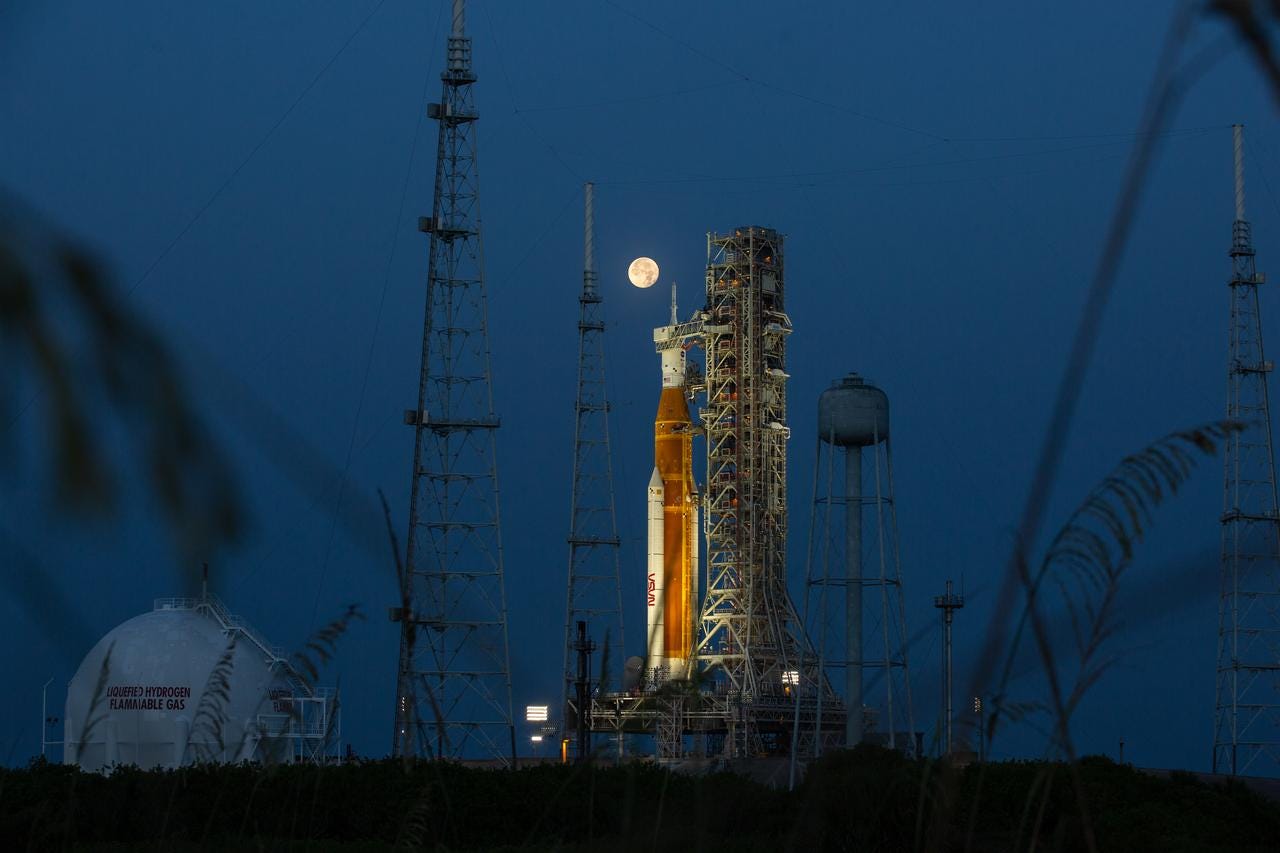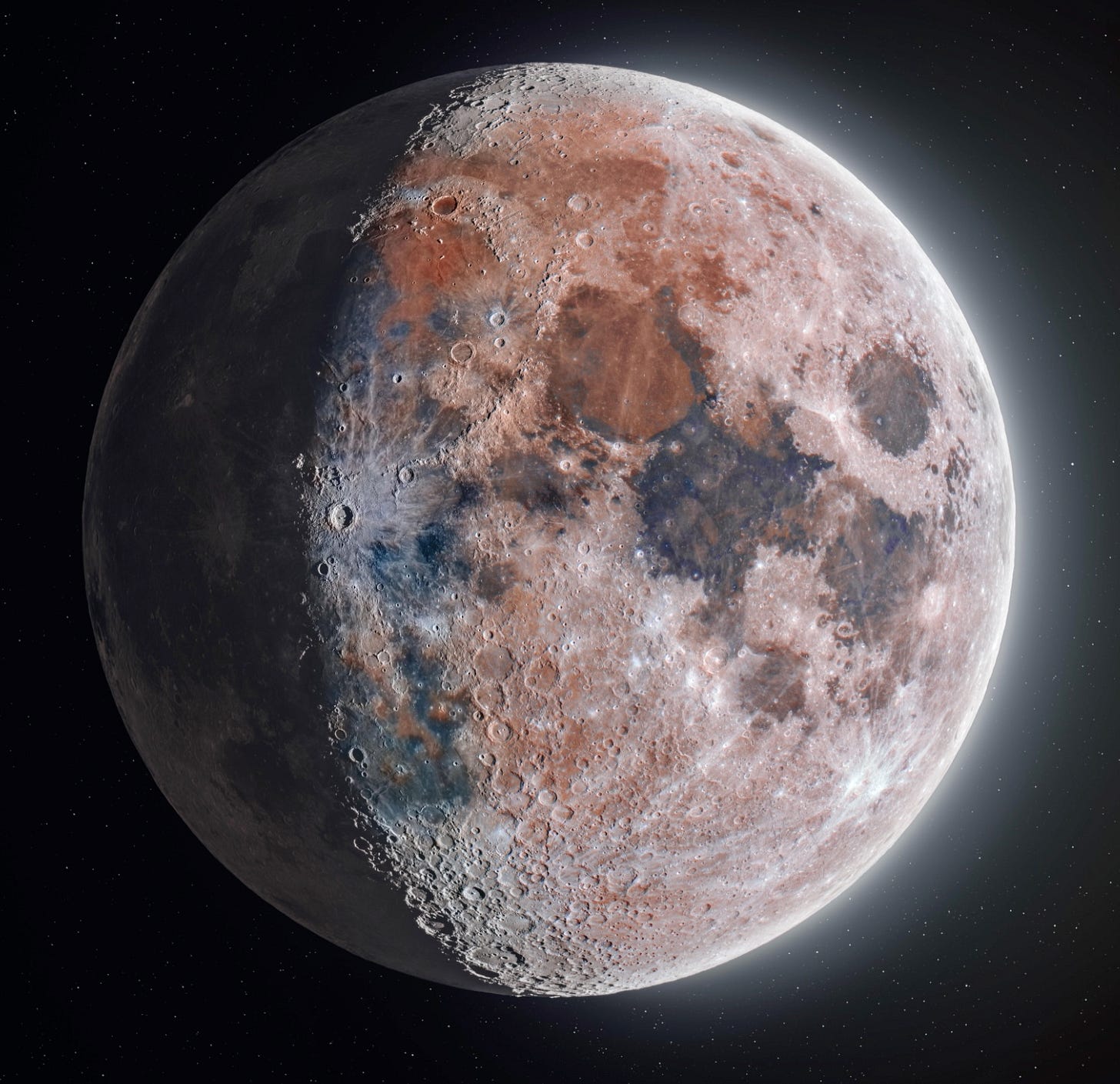Every week I highlight three newsletters that are worth your time.
If you find value in this project, do two things for me: (1) hit the Like button, and (2) share this with someone.
Most of what we do in Bulwark+ is only for our members, but this email will always be open to everyone. To get it each week, sign up for free here. (Just choose the free option at the bottom.)
1. To the Moon
Artemis 1 lights up on Monday and I’m pretty juiced. It’s the first of three planned missions: Artemis 2 will send a crew to Moon orbit. Artemis 3 will land astronauts on the Moon. Jatan Mehta writes a newsletter about space and devotes every Monday to Moon-talk. Here he is talking through Artemis 3:
Its astronauts will reach lunar orbit in an Orion spacecraft blasted from Earth by an SLS rocket. A crewed lunar variant of SpaceX Starship called the Human Landing System (HLS) will dock with Orion, and carry astronauts to the surface and back. While NASA’s selection of HLS Starship and commercial spacesuits largely culminate the technology stack to be used for this historic return of humans to the Moon after Apollo, the science end is now catching up. . . .
[T]he agency has now announced 13 candidate landing zones for Artemis III, chosen meticulously using data from the Lunar Reconnaissance Orbiter, decades of lunar science findings, and keeping in mind engineering constraints (discussed below).
A few interesting things to note about these selections:
Since a key priority of Artemis III is to cryogenically sample and bring pristine and precious lunar polar volatiles to Earth for meticulous studies, nearly all the landing zones contain numerous big and small permanently shadowed regions with Earth-facing slopes. This was expected but it’s good to have it anchored. Also considering that some of these zones contain locations with ancient crustal and/or mantle material, Artemis III is likely to further advance our understanding of the Moon’s origin and evolution.
At least two currently known landing regions of NASA CLPS missions show up for Artemis III too.
The VIPER rover is set to explore an area near the western edge of the Nobile crater whereas two Artemis III zones are on Nobile’s rim.
Intuitive Machines’ second lunar lander will touchdown on a ridge connected to the Shackleton crater.
The inclusion of the Malapert and Leibnitz plateaus is interesting because their near-polar locations coupled with high altitudes uniquely afford them practically 100% Earth-visibility despite the Moon’s libration.
Like any mission to the Moon’s poles, choosing a landing site for Artemis III has unique challenges. The steep, rocky polar terrain renders flat areas only about 100 meters across, which thus become the unforgiving landing precision requirement for HLS Starship or any lander. Moreover, the terrain coupled with the forever near-horizon, circling Sun provide sufficiently continuous lighting only to elevated areas such as crater rims or peaks, that too at different times for different places. The final landing site and launch date(s) for the Artemis III mission, which needs continuous lunar polar sunlight for 6.5 days, will thus be selected based on aforementioned factors as well as combined constraints from SLS, Orion, and Starship.
Read the whole thing and subscribe. It’s free and it’s great.
Look, I get it if space doesn’t blow your skirt up. But SpaceX is doing incredible work. We just got the Webb telescope operational. We’re going back to the Moon. These achievements remind us that we can still do hard things. Remind us that even when some parts of life are shrouded in darkness, there’s still light.
Artemis is apolitical. You can be thrilled about it no matter who you voted for. You can feel good about this. Check that: You should feel great about it.
So celebrate the men and women who spent years making Artemis possible. Give thanks for the legacy of all those who built America’s space program from scratch and got us here.
And hold fast to the understanding that tomorrow can be better, if we will it to be.
Bonus: Over on Reddit, two guys teamed up to take the most ridiculously detailed picture of the moon possible this side of NASA. It took two years and 174 megapixels and the result is simply amazing. The thread about the project is here.
The image itself is below. You have to click on the picture and start pinching and zooming to get the full effect. It will blow your mind.
2. Projection
Normally, my friend Shay Khatiri writes about foreign policy in his newsletter, the Russia-Iran File. This week he took dead aim at “nationalist conservatives” and it was awesome:
I’m sure that you have seen the news about Prime Minister Sanna Marin of Finland. If you have not, here’s a roundup: The good lady from Finland was caught on camera partying and dancing. That’s it. Literally.
So a “scandal” broke. The nationalists who defended Boris Johnson amidst the Partygate were outraged that Marin was partying. . . .
Anyway.
The anti-Marin camp of quasi-intellectuals with verified Twitter accounts were also the defenders of the Canadian truck drivers who before that were outraged by Australian totalitarianism over lockdowns.
Some of these right-wingers are your average conservative. Others, however, are the self-proclaimed nationalists. . . .
They are not nationalists. They are the same globalists they hate, just that they want a different kind of globalism. . . .
In short, it is not globalism they oppose. It is liberalism, the bipartisan, cross-ideological liberalism that Harry Truman and Ronald Reagan shared. It is not globalism they oppose but the liberal international order. And their beef with Marin is not that she partied. It’s that she’s young, feminist, and progressive, and that she has applied for NATO membership. . . .
This nationalist movement . . . objects to global cultural trends like rising secularism and cultural progressivism . . . It is operationally forming a global coalition of cultural conservatives to push back. . . .
[T]oday’s nationalists are the same as the nineteenth and twentieth century nationalists were. They object to liberal trade just as German nationalists in the nineteenth century did. They are reactionaries to cultural changes as the European nationalists of the time did. They resent the elite and academia just like their predecessors from two centuries ago—and one century ago. And they want to rewrite the world order for their common vision. They are not liberal because they are indeed nationalists. But also, they are globalists. The two are perfectly compatible.
Read the whole thing and subscribe.
This is always the way with these people: The folks who supported Roy Moore accuse other people of being pedophiles. They defend the most corrupt president in modern history and complain about “the swamp.” They rail against “election fraud” when most of the fraud that did take place was done in service of their candidate.
And they complain about “globalism” while trying to put together an international network of actors to sabotage liberal democracies across the globe.
Projection. It’s always projection.
3. Maskirovka
“Russia is where Occam’s razor goes to die.” That’s Julia Ioffe summing up the mysterious assassination of Darya Dugina.
From the outside, knowing absolutely nothing, it seems plausible that the possible explanations include:
Either a sanctioned or unsanctioned Ukrainian op.
A Putin-directed FSB op aimed at creating war sympathy.
An intra-Kremlin op driven by Alexander Dugina’s enemies.
An intra-Kremlin op using Dasha Dugina as a proxy for some other factional schism.
Something else altogether?
Cathy Young has been following this for us closely at The Bulwark and her stuff has been outstanding.
Here’s Ioffe’s take:
Dugin is the bearded imperialist ideologue who created the notion of russkii mir, or “Russian world,” the pan-Slavic universe or nationalist ethnostate that would span Russia, Belarus, and Ukraine (“little Russia”). It is the very vision that Putin began to implement on February 24. The car fire hadn’t been extinguished before the speculation began: who could’ve come for Dugin? The Ukrainians? The F.S.B.? And, more importantly, why?
The Ukrainians denied the involvement immediately and repeatedly, but that didn’t stop the F.S.B. from apparently cracking the case with eyebrow-raising speed. For years, it had failed to find who had ordered the killing of opposition leader Boris Nemtsov or journalist Anna Politkovskaya, but in just two days, it had cracked the case of who killed Dasha Dugina. It was, they said, a Ukrainian woman named Natalia Vovk, who entered Russia from Ukraine with her 12-year-old daughter, a petite dog, and a Mini Cooper, planted the bomb that killed Dugina, and left, crossing into Estonia. . . .I am not normally a false flag kind of girl, but Russia is a false flag kind of place and Putin is a false flag kind of guy. After all, it’s partly how he consolidated power. During one September morning, back 1999, apartment buildings all over Russia began to explode in the early morning hours, killing hundreds of Russians as they slept. Putin, then the prime minister who had just served as the head of the F.S.B., immediately blamed the Chechens in the south and used it justify escalating a war that would introduce him to the Russian people, turning him in their eyes from a gray-faced functionary into a strong and decisive leader, a president.
Like Ioffe, I am also not a false-flag type. And I suppose you could come up with reasonable alternatives.
For instance: Perhaps the FSB didn’t plan the op, but was merely being opportunistic in quickly hanging it on the Ukrainians after it happened.
Anything is possible.
But this detail . . . wow:
In his eulogy, Dugin said that his daughter’s first words as a baby were “Russia” and “empire,” and that she had died for the Russian people—the Volk.
Like I said, anything is possible. But Russian literature is what it is for a reason. Write what you know.
If you find this newsletter valuable, please hit the like button and share it with a friend. And if you want to get the Newsletter of Newsletters every week, sign up below. It’s free.
But if you’d like to get everything from Bulwark+ and be part of the conversation, too, you can do the paid version.






How come other countries get to have leaders who are capable of physical movement, let alone dancing? I'm old, which makes me want to say to all the old people running our country: "get off our lawn."
I agree with Shay Khatiri's take on conservative nationalists. However, I think there is an additional reason for their negative reaction to Sanna Marin. I'm not a psychiatrist, but I can't help but believe there is a major psycho-sexual aspect to the Marin animosity. Her combination of good looks, self-confidence (if you saw the party video, you understand), brains, political ambition and leadership capability is simply too much for these guys (they are mostly guys, right?). Especially leading a country like Finland, which despite being a successful social welfare democracy, still conjures images of tough guys with bolt-action rifles in a snowy forest battling Russians to a draw. Marin creates a level of cognitive dissonance that must be painful. Furthermore, they see Marin dancing at that party and the deepest, darkest part of their brains tells them they are utterly "not worthy." Hope my armchair psychology doesn't offend anyone.